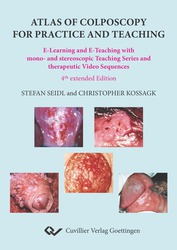| Departments | |
|---|---|
| Book Series (97) |
1381
|
| Nachhaltigkeit |
3
|
| Gesundheitswesen |
1
|
| Humanities |
2370
|
| Natural Sciences |
5407
|
| Mathematics | 228 |
| Informatics | 319 |
| Physics | 980 |
| Chemistry | 1364 |
| Geosciences | 131 |
| Human medicine | 243 |
| Stomatology | 10 |
| Veterinary medicine | 108 |
| Pharmacy | 147 |
| Biology | 835 |
| Biochemistry, molecular biology, gene technology | 121 |
| Biophysics | 25 |
| Domestic and nutritional science | 45 |
| Agricultural science | 1005 |
| Forest science | 201 |
| Horticultural science | 20 |
| Environmental research, ecology and landscape conservation | 148 |
| Engineering |
1798
|
| Common |
98
|
|
Leitlinien Unfallchirurgie
5. Auflage bestellen |
|
Advanced Search
Atlas of Colposcopy for Practice and Teaching (English shop)
E-Learning and E-Teaching with mono- and stereoscopic Teaching Series and therapeutic Video Sequences
Christopher Koßagk (Author)Stefan Seidl (Author)
Preview
Extract, PDF (15 MB)
Table of Contents, PDF (53 KB)
Colposcopy has contributed significantly to knowledge about cervical cancer. Developed in Germany by Hans Hinselmann, it plays a significant role in the identification, early detection and treatment of cervical cancer. Dr Seidl is a pioneer of colposcopy and recognised early on the typical changes in the external and internal cervix over the course of a woman’s life and the colposcopic equivalents of the precursors of cervical carcinoma.
As a gynaecologist (and pathologist), Dr Seidl has taken up the cause of early diagnosis of cervical carcinoma and its precursors. He is considered a protagonist of colposcopy in post-war Germany due to his experience in 60 years of work with many publications and further training at home and abroad (introduction of colposcopy in Africa).
Dr. Seidl has made his extensive training material available to interested doctors in a special and unique form in the form of a colposcopy atlas:
- For doctors who want to familiarise themselves with colposcopy for their practice.
- For doctors who want to use the didactic teaching material, arranged according to the new nomenclature (Rio 2014), for their own further training.
He has revised this book – now in its 4th edition with his co-author Dr Kossagk from AGCPC.de – in memory of his famous predecessors in German-speaking countries, such as Hinselmann, Ganse, Mestwerdt (Germany), Wespi (Switzerland) and Burghrdt (Austria) and in appreciation of this original German diagnostic method, and has added several innovations. For example, the photo and video material can now also be accessed online in streaming mode. The DVD originally used for this purpose has been abolished. In addition, new chapters have been included, with the chapters on peniscopy and mammilloscopy in particular falling outside the scope of a usual colposcopy book.
The book is unique among colposcopy publications worldwide, as it covers the entire spectrum of gynaecological diagnostics with over 900 colour colposcopic illustrations and therapeutic video sequences. In addition to chapters on findings of the portio, vagina and vulva, new chapters such as functional colposcopy, mamilloscopy and peniscopy are presented in a thoroughly edited form. Of course, colposcopy is emphasised as playing an essential role in the early diagnosis of carcinoma and preliminary stages (dysplasias) in the genital area, with the difficult modern differential diagnosis facilitating the evaluation of findings. An important chapter is the colposcopic observation of the course of the disease, which often leads to a definitive diagnosis!
In addition to these important tasks, there is – especially for doctors in practice – a broad diagnostic field in the context of the various inflammations (STD) and functional hormone-related changes in the genital area. A chapter on changes in the nipple highlights Paget’s disease and justifies the use of colposcopy.
The new chapter on peniscopy is the first colposcopy book to discuss the role of men in sexually transmitted HPV infections and to propose modern early diagnosis (secondary prophylaxis). These statements are supported by years of experience in examinations of men and by convincing colposcopic images of carcinomas and its precursors.
| ISBN-13 (Hard Copy) | 9783736976832 |
| ISBN-13 (eBook) | 9783736966833 |
| Final Book Format | A4 |
| Language | German |
| Page Number | 400 |
| Lamination of Cover | matt |
| Edition | 4. extended |
| Publication Place | Göttingen |
| Publication Date | 2023-05-25 |
| General Categorization | Non-Fiction |
| Departments |
Human medicine
|
| Keywords | Kolposkopie, Vulvoskopie, Mamilloskopie, Funktionskolposkopie, Differentialkolposkopie, Targetbiopsie, Krebsfrühdiagnostik, Dysplasie, Dysplasiesprechstunde, Dysplasiezentrum, Neue kolposkopische Nomenklatur, Kolposkopische Terminologie, Elementarkolposkopie, Normale Befunde, abnorme Befunde Grad 1 (minor change), abnorme Befunde Grad 2 (major change), monoskopische Lehrserien, stereoskopische Lehrserien, Verlaufskontrollen, ambulante Therapie, Dyshygrasie, Erythroplakie, Leukoplakie, Mosaik, Punktierung, essigweißes Epithel, Ulkus, Karzinom, Vaskularisation, Erosion, Ektopie, Transformationszone, Portio, Zervix, Vagina, Vulva, HPV-Infektion, HP-Viren, Virustest, Befunddokumentation, E-Learning, E-Teaching, Video-Kolposkopie, Telekonsultation, Telematik, Teleskopische Kommunikation, VIA(visuelle Inspektion mit Acetic-Acid), Peniskopie, cervical cancer, Gebärmutterhalskrebs, Histopathologie, histopathology, Perinatalzentrum, Brustzentrum, colposcopy, vulvoscopy, mamilloscopy, functional colposcopy, differential colposcopy, early cancer diagnostics |








